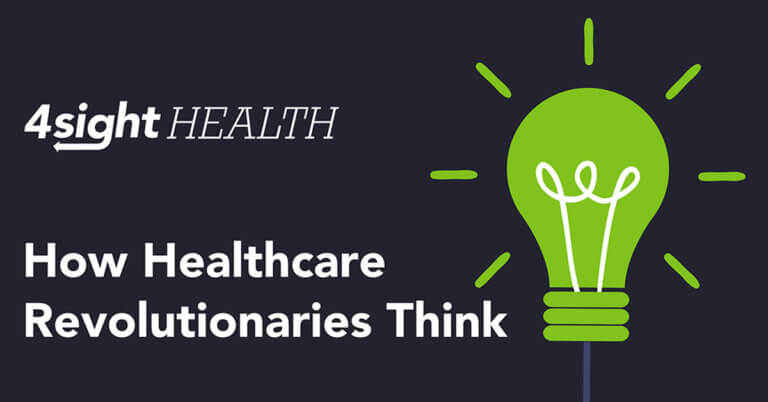December 19, 2018
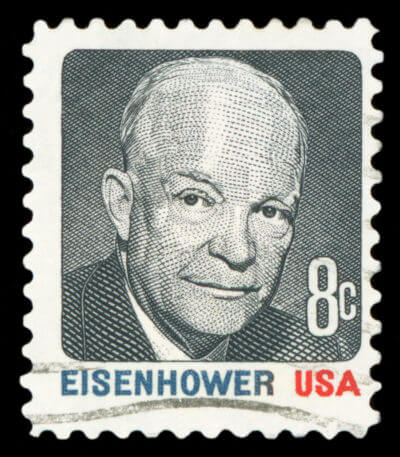
Eisenhower’s Prophecy: The Healthcare Industrial Complex®
On January 17, 1961, three days before leaving office, Dwight D. Eisenhower spoke to the nation one last time as its president. Eisenhower’s observations about war, peace and democracy are timeless. They reflect a deep understanding of human nature, progress and balanced governance.
Eisenhower used his farewell address (1) to warn the nation about the threats posed by the military industrial complex, the scientific technological elite and excessive government debt.
Although focused on the cost and influence of military interests, Eisenhower’s warnings have prophetic applicability to healthcare. Congress, the healthcare industry and related government agencies aggressively pursue power and profit, which has created a healthcare industrial complex (a 4sight Health term) of immense proportions. This unholy trinity relentlessly pursues its parochial interests to the detriment of American society and to its most vulnerable citizens, the sick and the injured.
Eisenhower’s warnings reflected hard-learned wisdom from managing large, complex organizations in a period of unprecedented global turmoil.
FROM MODEST ROOTS TO THE PINNACLE OF POWER
The third of seven boys, Dwight David Eisenhower was born in Denison, Texas on October 14, 1890. With only $24, the Eisenhower family moved to Abilene, Kansas, two years later. Though poor, young Dwight was active outdoors, a good student and a voracious reader with a particular interest in military history.
Lacking funds, Dwight and his brother Edgar agreed to alternate years at college so they could pay for one another’s education. Edgar began college while Dwight worked as a night supervisor at the Belle Springs Creamery. When Edgar asked to stay a second year in college, Dwight took and passed the entrance exam for West Point (which was tuition free) and enrolled in 1911. Thus, began Eisenhower’s remarkable career in the U.S. Army.
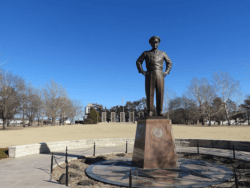 Eisenhower steadily moved through the ranks and began WWII on the General Staff in Washington, D.C., where he supervised war planning in multiple theaters of battle. In December 1943, President Roosevelt chose Eisenhower to become the Supreme Allied Commander in Europe. From that position, Eisenhower planned the D-Day invasion, liberated Europe and forced German surrender in May 1945. As the architect of Allied victory in Europe, Eisenhower became a war hero and household name.
Eisenhower steadily moved through the ranks and began WWII on the General Staff in Washington, D.C., where he supervised war planning in multiple theaters of battle. In December 1943, President Roosevelt chose Eisenhower to become the Supreme Allied Commander in Europe. From that position, Eisenhower planned the D-Day invasion, liberated Europe and forced German surrender in May 1945. As the architect of Allied victory in Europe, Eisenhower became a war hero and household name.
In rapid succession, Eisenhower became the Military Governor in Germany and the Army Chief of Staff, wrote a best-selling memoir, became president of Columbia University, served as the informal Chairman of the Joint Chiefs of Staff, and accepted appointment as the North Atlantic Treaty Organization’s (NATO’s) first Supreme Commander. And then ran for president.
Running as a Republican for U.S. President in 1952, Eisenhower defeated Adlai Stevenson in a landslide, 449 electoral votes to 89. At age 62, he became the oldest man elected President since James Buchanan in 1856. Eisenhower easily defeated Stevenson again in 1956 and maintained high approval ratings of more than 65 percent throughout his two terms in office.
During his presidency, Eisenhower launched the national highway system, ended the Korean War and kept the peace with the Soviet Union during a perilous time. By never revealing his intentions regarding nuclear weapons use, author Evan Thomas argues in Ike’s Bluff (2) that Eisenhower was able to keep both the Soviet Union and the U.S. military establishment off balance and in check – in essence, keeping the peace without breaking the bank.
Over the course of his lifetime, Eisenhower experienced three global wars firsthand and lived through the Great Depression. He witnessed the economic devastation and human suffering caused by unbridled capitalism, fascism and communism. After the hydrogen bomb’s creation, he experienced the lonely responsibility of being America’s first nuclear president.
It was in this context that Eisenhower chose to share his concerns regarding America’s future in his farewell address as president to the American people.
THE HEALTHCARE INDUSTRIAL COMPLEX
Given his storied military and political career, most listeners expected an “old soldier’s” valedictory. That was not to be the case. Instead, Eisenhower dissected the moral dimensions of global leadership.
“…America is today the strongest, the most influential and most productive nation in the world. Understandably proud of this pre-eminence, we yet realize that America’s leadership and prestige depend, not merely upon our unmatched material progress, riches and military strength, but on how we use our power in the interests of world peace and human betterment.
America’s leadership and prestige depend…on how we use our power in the interests of world peace and human betterment.”
The President then applied his belief the America’s military establishment of that time.
Until the end of WWII, America had never had a permanent armaments industry. While deemed necessary to keep the peace after WWII, Eisenhower warned Americans of the grave dangers to a free society posed by an emerging “military industrial complex.”
“This conjunction of an immense military establishment and a large arms industry is new in the American experience. The total influence – economic, political, even spiritual – is felt in every city, every state house, every office of the Federal government. We recognize the imperative need for this development. Yet we must not fail to comprehend its grave implications. Our toil, resources and livelihood are all involved; so is the very structure of our society.
In the councils of government, we must guard against the acquisition of unwarranted influence, whether sought or unsought, by the military-industrial complex. The potential for the disastrous rise of misplaced power exists and will persist.
We must never let the weight of this combination endanger our liberties or democratic processes. We should take nothing for granted only an alert and knowledgeable citizenry can compel the proper meshing of huge industrial and military machinery of defense with our peaceful methods and goals, so that security and liberty may prosper together.”
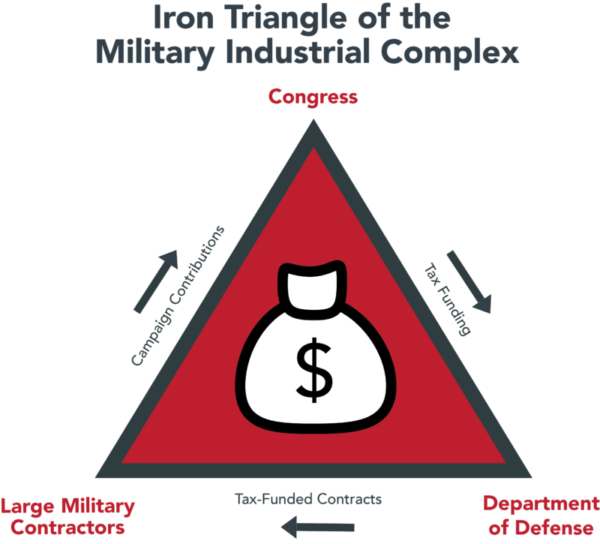
Eisenhower coined the term “military industrial complex” to describe how an unholy trinity of the Defense Department, Congress and military contractors work to promote their own interests at the expense of American society. Political scientists developed the phrase “the iron triangle” to describe the flows of money, people and influence that promote excessive defense spending and sustain the military establishment.
Almost 60 years later, President Eisenhower’s warnings remain applicable to America’s broken healthcare system more than to the military establishment. In 1961, military spending and healthcare constituted 9 percent and 5 percent of the U.S. economy respectively as measured by Gross Domestic Product (GDP). By 2016, healthcare consumed 18 percent of GDP, the military only 3 percent. 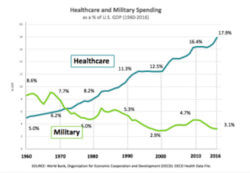
The U.S. spends far more on healthcare per capita than any other advanced economy yet experiences much lower health outcomes. The next big country with the next-highest percentage of healthcare expenditure is France at 12 percent of its GDP. But life expectancy in France is almost four years longer than in the U.S. In fact, American life expectancy is now declining for the first time in the nation’s history.
The Healthcare Industrial Complex® is the new Military Industrial Complex on steroids. Congress, a massive healthcare bureaucracy and an equally massive healthcare industry conspire to drive U.S. healthcare spending ever higher without delivering commensurate health benefits. Healthcare’s “iron triangle” is far more powerful and destructive than the military’s iron triangle has ever been.
Healthcare’s all-consuming appetite for resources steals from more productive sectors of the American economy. More importantly, the services the healthcare industrial complex delivers are not the services the American people need, want and desire. This is the root cause of America’s healthcare crisis.
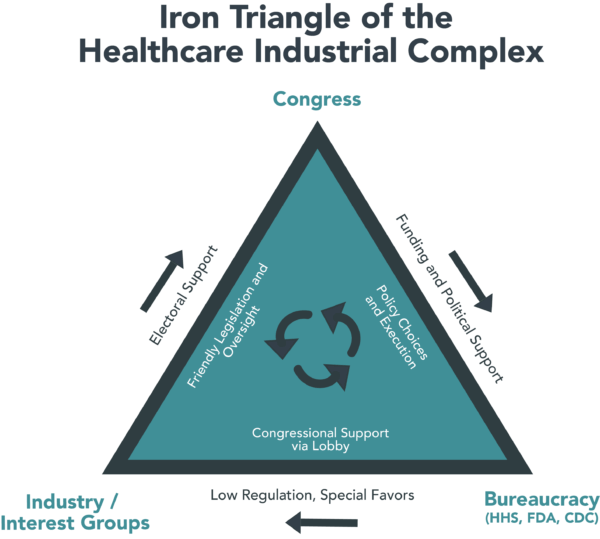
THE SCIENTIFIC-TECHNOLOGICAL ELITE
After explaining the dynamics of the military industrial complex, Eisenhower issued a second warning against an emerging “scientific-technological elite” that is dependent upon government contracts and funding.
“Today, the solitary inventor, tinkering in his shop, has been over shadowed by task forces of scientists in laboratories and testing fields. In the same fashion, the free university, historically the fountainhead of free ideas and scientific discovery, has experienced a revolution in the conduct of research. Partly because of the huge costs involved, a government contract becomes virtually a substitute for intellectual curiosity. For every old blackboard there are now hundreds of new electronic computers.
The prospect of domination of the nation’s scholars by Federal employment, project allocations, and the power of money is ever present and is gravely to be regarded. Yet, in holding scientific research and discovery in respect, as we should, we must also be alert to the equal and opposite danger that public policy could itself become the captive of a scientific-technological elite.”
Fast forward to the current day and Eisenhower’s prophecy has become reality in academic medicine. Academic medical enterprises rank themselves according the numbers and amounts of National Institute of Health (NIH) funding they receive. The competition among principal investigators retards collaboration and creates a cultural bias toward research silos.
The vast majority of NIH funding targets biomedical breakthrough research that supports the healthcare industrial complex’s ability to consume ever-greater percentages of societal resources. More disturbingly, medical research underinvestigates how social determinants of health (e.g. housing, transportation, poverty, food insecurity, etc.) influence the American people’s health status. The Healthcare Industrial Complex® funds the research that pays, not the research that generates the greatest benefit for society.
MORTGAGING AMERICA’S FUTURE
Finally, Eisenhower warned against excessive public spending, particularly debt-financed spending.
“As we peer into society’s future, we – you and I, and our government – must avoid the impulse to live only for today, plundering, for our own ease and convenience, the precious resources of tomorrow. We cannot mortgage the material assets of our grandchildren without risking the loss also of their political and spiritual heritage. We want democracy to survive for all generations to come, not to become the insolvent phantom of tomorrow.”
 Today, healthcare-related expenses are the leading cause of personal bankruptcy. (3) Healthcare is the largest and fastest-growing budget item for federal and state governments. It’s the leading driver of deficit spending. Imagine how President Eisenhower would characterize today’s bloated and ineffective healthcare system.
Today, healthcare-related expenses are the leading cause of personal bankruptcy. (3) Healthcare is the largest and fastest-growing budget item for federal and state governments. It’s the leading driver of deficit spending. Imagine how President Eisenhower would characterize today’s bloated and ineffective healthcare system.
BALANCE AND SKEPTICISM
Eisenhower’s lifetime of leadership experience gave him a hard-learned appreciation for the role balance plays in governance. Near the beginning of his farewell address, Eisenhower eloquently address the need for balance in governmental decision making.
“…each proposal must be weighed in the light of a broader consideration: the need to maintain balance in and among national programs
- balance between the private and the public economy;
- balance between cost and hoped for advantage;
- balance between the clearly necessary and the comfortably desirable;
- balance between our essential requirements as a nation and the duties imposed by the nation upon the individual;
- balance between action of the moment and the national welfare of the future.
Good judgment seeks balance and progress; lack of it eventually finds imbalance and frustration.”
Eisenhower fundamentally understood that human beings can be agents for good or evil. Productive societies accentuate human potential and limit human depravity. In this sense, Eisenhower’s worldview exhibits a theological wisdom about human nature.
A contemporary of Eisenhower’s, Reinhold Niebuhr, was the 20th century’s most influential theologian. Niebuhr’s books and sermons addressed the need for moral action while acknowledging the flawed nature of human reasoning and judgment.
“Niebuhr’s analysis of human nature and history came as a vast illumination. His argument had the double merit of accounting for Hitler and Stalin and for the necessity of standing up to them.” (4) was the observation of acclaimed historian Arthur Schlesinger Jr.
Niebuhr synthesized humanity’s creative-destructive dynamism eloquently in his 1944 book The Children of Light and the Children of Darkness.
“Human beings’ capacity for justice makes democracy possible, but human beings’ inclination toward injustice makes democracy necessary.”
Eisenhower’s leadership embodied “Niebuhrian” logic. Managing the affairs of nations requires a healthy dose of skepticism regarding human motivation.
Applying Niebuhrian logic to healthcare reveals a harsh truth. The American healthcare industry operates the U.S. healthcare system for its own benefit, not for the benefit of the American people.
The parasitic symbiosis of Congressional, industry and bureaucratic interests has spread beyond the military and infected the entire U.S. healthcare system. Healthcare will soon consume 20 percent of the U.S. economy, and it has demonstrated no ability to restrain its voracious appetite for more societal resources. The scale of healthcare’s malfeasance threatens societal well-being at the national, state, community and individual levels.

BREAKING THE STRANGLEHOLD
America will not change the way it delivers healthcare until it changes the way it pays for healthcare services. But payment reform, while essential, is not sufficient to break The System’s stranglehold on the mechanics of healthcare expenditure.
Enlightened regulatory reform and eliminating the capture of governmental healthcare agencies by special interest groups must augment payment reform to create the healthcare system the American people deserve.
America has it within its power to create and operate a healthcare system that meets the real health and healthcare needs of the American people with fairness, compassion and effectiveness. Achieving this goal is this generation’s most pressing public policy challenge. Like Eisenhower’s admonition to guard against the military industrial complex, we must realize the future state of the nation depends on whether and how the American people take up the challenge to break the Iron Triangle of the Healthcare Industrial Complex®.





